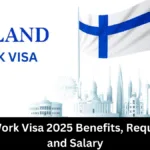South Korea is a major economic power in Asia, making it a sought-after destination for foreign workers. Every year, thousands of people from countries like Pakistan, India, Nepal, and Bangladesh apply for a South Korean work visa to secure stable, high-paying jobs and a better quality of life.
Key Benefits
- Legal Employment & Residency: You can legally live and work in South Korea.
- Family Sponsorship: Eligible workers can bring their family members to join them after obtaining residency.
- Higher Salary: Wages in South Korea are generally higher than in most other Asian countries.
- Career Growth: Job opportunities are available across various sectors, including manufacturing, agriculture, construction, IT, and healthcare.
- Path to Residency: After several years of working legally, you may be eligible to apply for permanent residency or citizenship.
Visa Categories
South Korea offers several types of work visas:
- E-9 Visa (Non-Professional Employment): This is for workers in sectors such as manufacturing, agriculture, and construction.
- E-7 Visa (Skilled Professionals): This visa is for experts and skilled workers in fields like IT and engineering.
- H-2 Visa (Working Visit Visa): This visa is for ethnic Koreans from specific countries.
- D-5 to D-10 Visas: These are for specific purposes like research, internships, or job-seeking.
Eligibility Criteria
- Age: You must be between 18 and 40 years old.
- Passport: A valid passport with at least six months of validity is required.
- Clean Record: You must not have any criminal record.
- Language Proficiency: Passing the EPS-TOPIK (a basic Korean language test) is mandatory.
- Health: A medical fitness certificate is required.
- Skills: You must have the necessary skills, training, or work experience in the field you are applying for.
Salary in South Korea (2025)
The minimum wage in 2025 is approximately ₩9,860 per hour. The actual salary can vary based on the company, your skills, and any overtime work.
| Job Category | Average Monthly Salary (₩) | Approx. PKR (2025) |
|---|---|---|
| Factory Workers | ₩2,000,000 – ₩2,500,000 | PKR 420,000 – 520,000 |
| Construction Workers | ₩2,300,000 – ₩3,000,000 | PKR 480,000 – 630,000 |
| Agriculture & Farming | ₩1,800,000 – ₩2,200,000 | PKR 370,000 – 460,000 |
| Skilled Technicians / IT | ₩3,000,000+ | PKR 630,000+ |
Required Documents
To apply, you will need to prepare the following documents:
- Valid passport (with more than six months of validity)
- Completed work visa application form
- Passport-sized photos
- Employment contract or job offer letter
- EPS-TOPIK language test certificate
- Educational and training certificates
- Health insurance proof
- Police clearance certificate
- Accommodation details in Korea
Application Procedure
The process is generally a multi-step one:
- EPS-TOPIK Test: Register and pass the test through the Overseas Employment Corporation (OEC) in your home country.
- Job Matching: Wait for a Korean employer to select you.
- Employment Agreement: Sign the labor contract.
- Visa Application: Submit all required documents to the Korean Embassy.
- Review & Approval: The embassy will review your application.
- Visa Issuance: Once approved, you will receive your South Korea work visa.
- Travel to Korea: Enter the country with your approved visa.
- Residency Registration: Apply for an Alien Registration Card (ARC) within 90 days of your arrival.
Processing Time
The total time for the entire process typically ranges from 3 to 5 months.
- EPS Test & Job Matching: 1–3 months
- Embassy Visa Process: 4–8 weeks
Visa Fees (2025)
The total estimated cost for the visa process ranges from ₩300,000 to ₩450,000 (PKR 60,000 – 90,000). The fee structure is as follows:
| Type | Fee (₩) | Approx. PKR |
|---|---|---|
| Visa Application | ₩80,000 | PKR 16,000 |
| EPS-TOPIK Test | ₩24,000 | PKR 5,000 |
| ARC Registration | ₩30,000 | PKR 6,000 |
| Health Check & Insurance | ₩150,000–300,000 | PKR 30,000 – 60,000 |
For Pakistani applicants, fees are paid through OEC Pakistan, while Indian applicants pay directly at the Korean Embassy.





